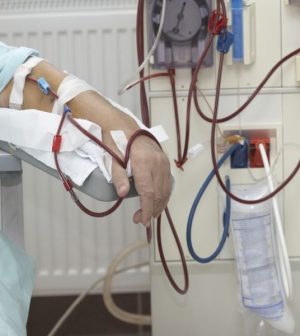- Could Your Grocery Store Meat Be Causing Recurring UTIs?
- Are You Making This Expensive Thermostat Error This Winter?
- Recognizing the Signs of Hypothyroidism
- 10 Strategies to Overcome Insomnia
- Could Artificial Sweeteners Be Aging the Brain Faster?
- Techniques for Soothing Your Nervous System
- Does the Water in Your House Smell Funny? Here’s Why
- Can a Daily Dose of Apple Cider Vinegar Actually Aid Weight Loss?
- 6 Health Beverages That Can Actually Spike Your Blood Sugar
- Treatment Options for Social Anxiety Disorder
Wildfire Smoke Raises Risks for Folks on Dialysis

Exposure to wildfire-related air pollution in western states has taken its toll on U.S. patients who are on dialysis.
New research linked it to elevated risks of hospitalization and death in patients who were receiving in-center hemodialysis treatment in Washington, Oregon and California.
Wildfires have been increasing in frequency and severity.
The researchers studied nearly 80,000 patients who received dialysis treatment at 191 Fresenius Kidney Care clinics in the three states from 2005 to 2018.
The investigators looked at the risk of all-cause hospitalization and death associated with wildfire exposure, using two metrics: wildfire smoke and wildfire-related fine particulate matter.
Exposure to wildfire smoke was associated with a 3% higher risk of hospitalization the following day, the study found.
The risk of death rose 5% on the day of exposure. Exposure to fine particulate matter from the fires was linked to a similar increase in risk.
“This research sheds light on the health risks faced by hemodialysis patients during wildfire events,” corresponding author Hyeonjin Song said in an American Society of Nephrology news release about the study.
“The most recent U.S. National Climate Assessment suggests that wildfire seasons will continue to get longer with a corresponding increase in frequency and intensity of wildfire events in response to ongoing climate change,” said Song, a doctoral student at the University of Maryland, College Park.
“We need to pay attention to how such hazards impact the most vulnerable among us and enhance our preparedness activities to minimize the disease burden,” she added.
The study findings were presented Thursday at a meeting of the American Society of Nephrology, in Philadelphia. Findings presented at medical meetings are considered preliminary until published in a peer-reviewed journal.
More information
The U.S. Centers for Disease Control and Prevention has more on wildfires and health.
SOURCE: American Society of Nephrology, news release, Nov. 2, 2023
Source: HealthDay
Copyright © 2026 HealthDay. All rights reserved.










